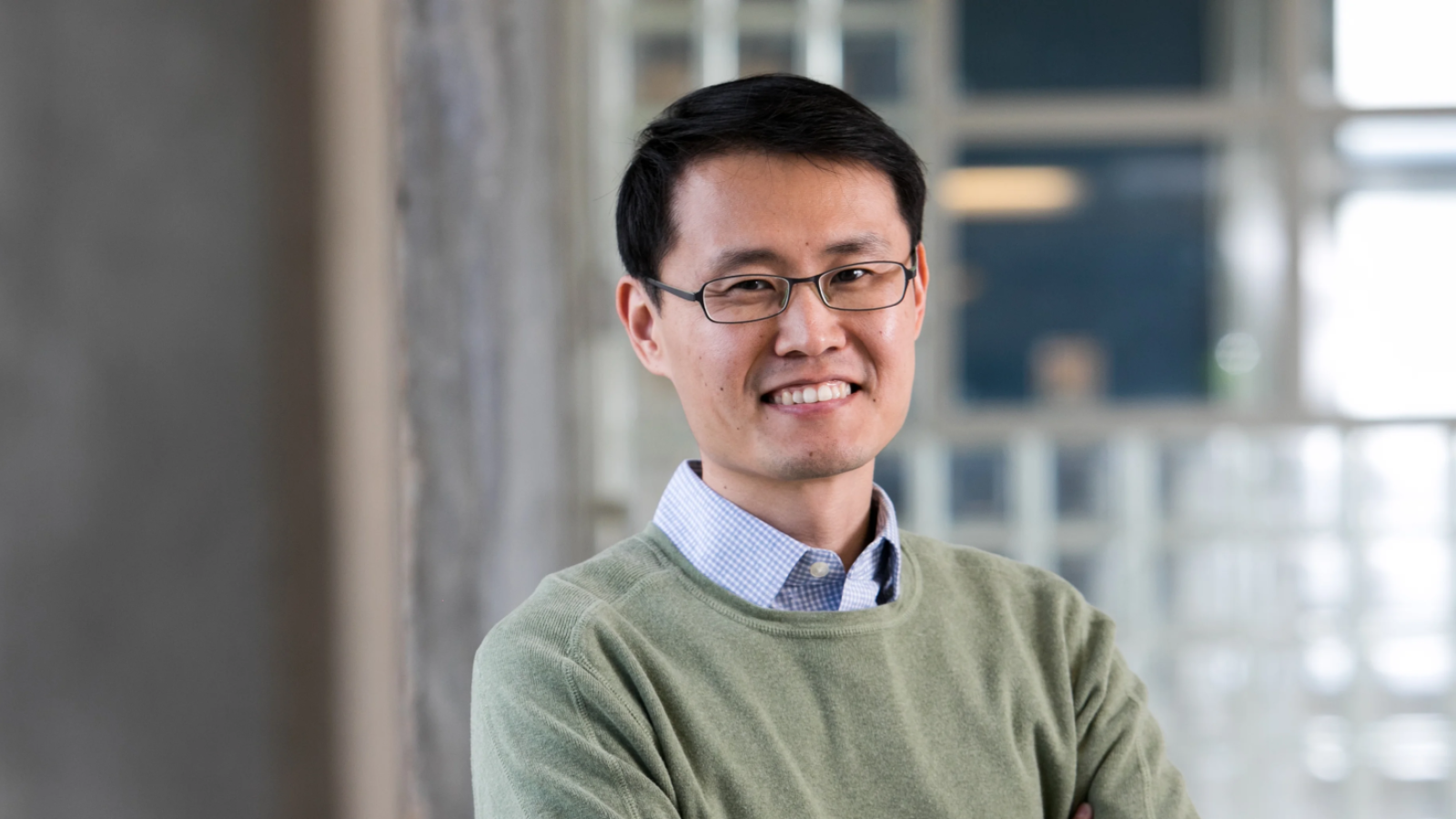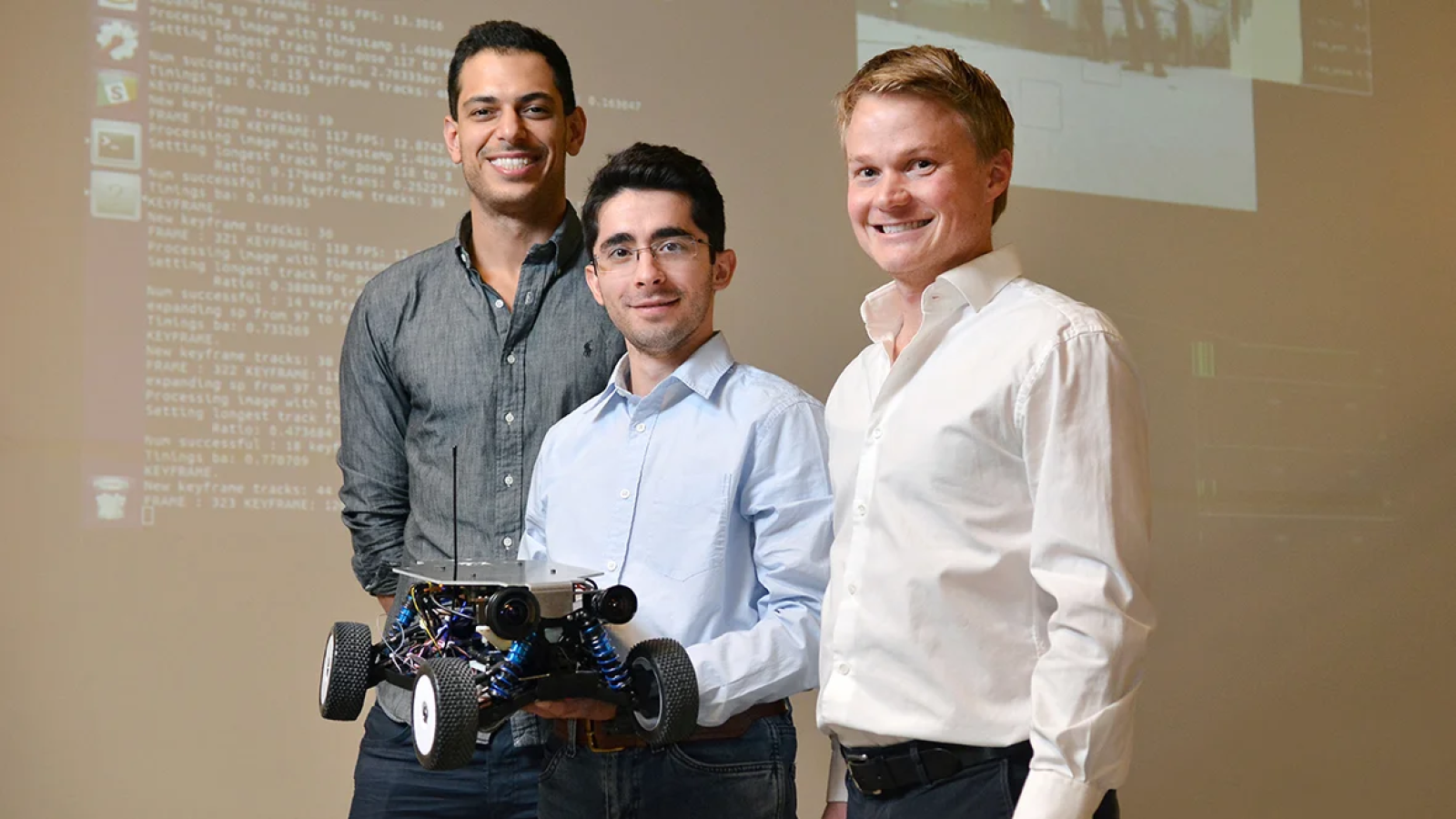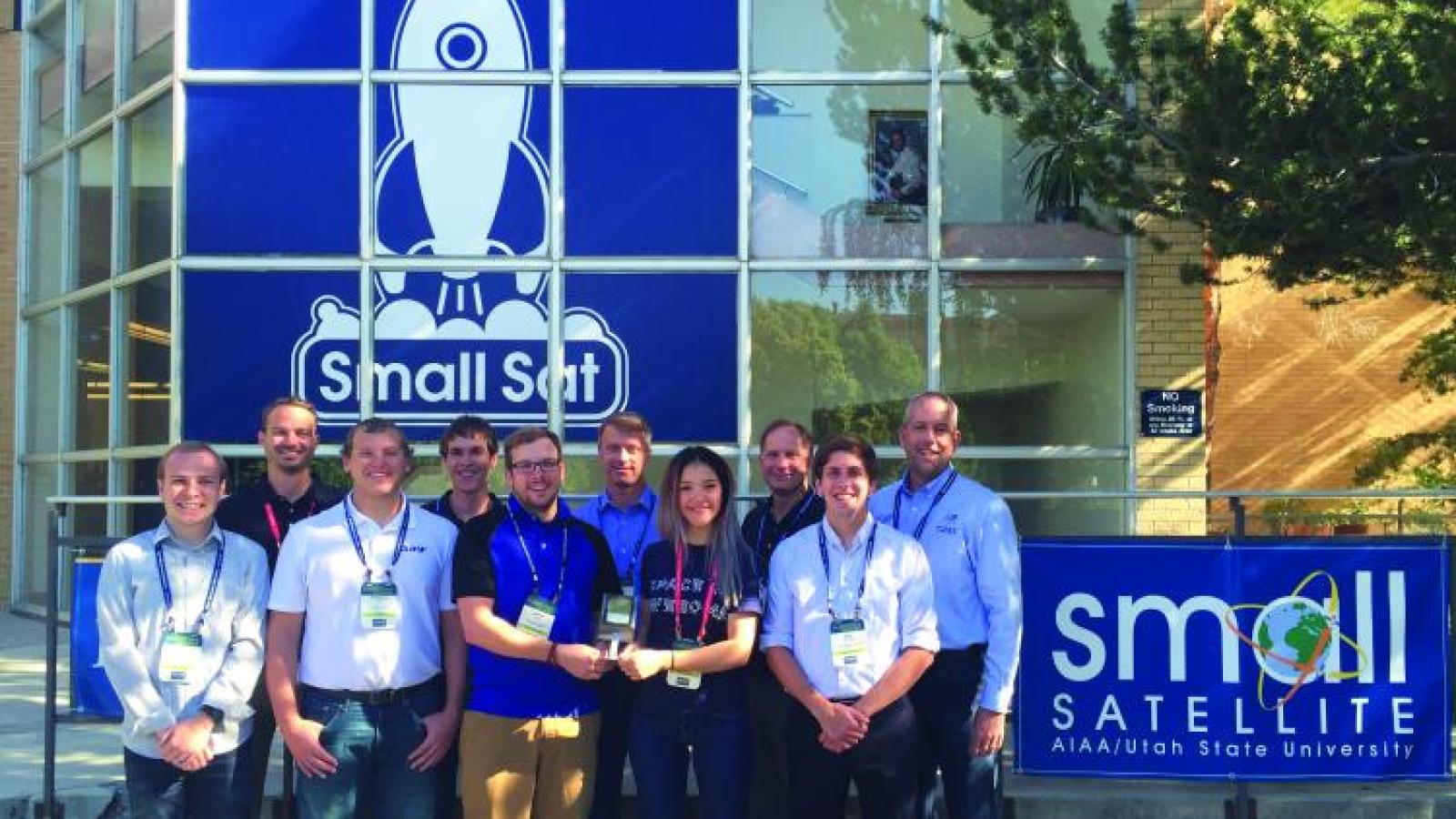
A golden opportunity
An idea borrowed from the football gridiron is helping students graduate and drawing major attention, thanks to a multimillion-dollar boost from the National Science Foundation (NSF).
Eight years ago, CU Engineering created the GoldShirt program. It’s modeled after redshirting for college athletes. Promising students who want to be engineers but weren’t fully prepared in high school are given an extra year to bone up on their skills in premajor math and science courses.
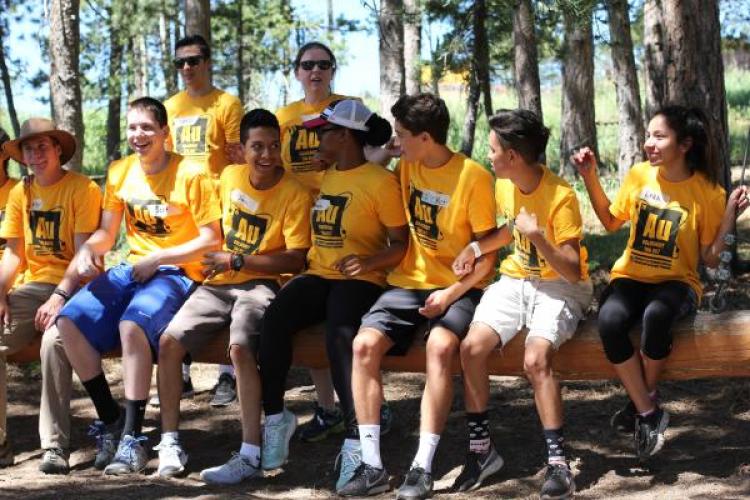
Fifty new GoldShirt students participated in the two-week Summer Bridge Program last summer. The program was full of activities including academic strength assessments, workshops to teach success strategies, hands-on project classes, a field trip to Google, a team-building day in the mountains, an evening at the Colorado Shakespeare Festival, and numerous fun group activities.
“It’s for the student whose high school didn’t offer AP calculus classes, or maybe their family moved many times while growing up. Engineering programs miss out on a lot of talent because of admission rules,” says Jana Milford, professor of mechanical engineering and GoldShirt faculty advisor.GoldShirt is more than just an extra year. Students also enroll in a unique projects course, live in a residential community, and have mentors to help them succeed.
“We’re zoomed in on each student,” says program director Tanya Ennis. “They know they’re not a number. Someone cares about them.”
The funding will allow engineering colleges at Boise State University, the University of California San Diego, and the University of Illinois Urbana-Champaign to establish their own programs and will also provide research funding to study all six schools and evaluate their success for potential future expansion.
To Milford, the program’s accomplishments are already clear.
"As a mechanical engineering faculty member, I see the students succeeding in upper-level classes. They're really impressive. You can see very tangibly how GoldShirt pays off," Milford says.
Ennis is hopeful the results from the research portion of the grant will convince more universities to invest in their own GoldShirt programs.
"If you have a student who wants to be an engineer and is motivated and they just need a little extra of this and a little extra of that to be successful, why wouldn't we do that?" Ennis says.
Since starting the initiative, one thing has become very clear: the program works. Students in it earn higher scores and are more likely to graduate, which has drawn growing interest from other universities. In 2013, the University of Washington and Washington State University created similar initiatives modeled on Colorado’s success, and now the NSF is expanding the program further with a $5 million grant to a multiuniversity consortium that includes CU Boulder.
Gallogly gifts of $2.5 million boost engineering education
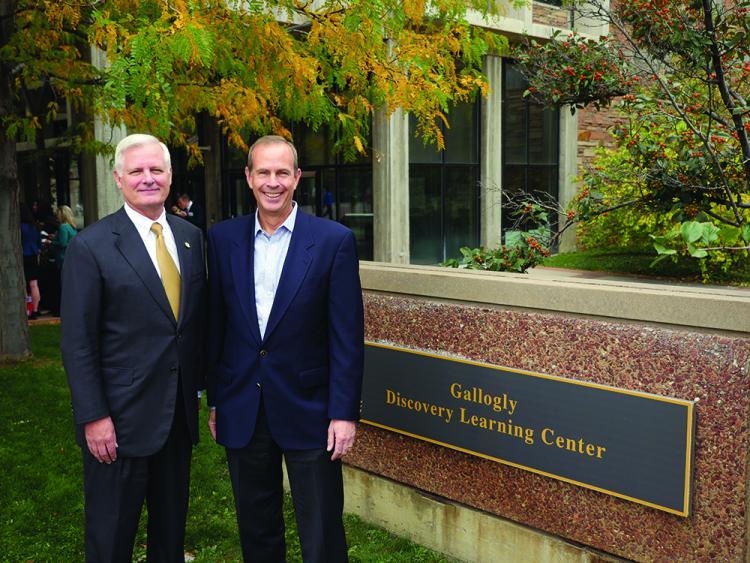
Alumnus Jim Gallogly, left, former CEO of LyondellBasell Industries and emeritus member of the CU Engineering Advisory Council, joins Mike Wirth, Chevron Corp. vice chairman and chair of the CU Engineering Advisory Council, after unveiling a sign bearing the new name for the Discovery Learning Center.
With $2.5 million in gifts, Colorado’s Gallogly family is naming the Discovery Learning Center and boosting the teaching and research power of CU Engineering with two faculty positions.
James L. “Jim” Gallogly, his wife, Janet, and family gave a $1.5 million lead gift to establish the Robert H. Davis Endowed Chair in Discovery Learning, named in honor of the college’s former dean. The college’s Engineering Advisory Council, of
which Jim Gallogly is an emeritus member, raised an additional $500,000 in private support, which the campus then matched with a $500,000 contribution.
Additionally, a $1 million gift from the Gallogly family establishes an endowed professorship in the chemical and biological engineering department. Endowed chairs and professorships help attract and retain brilliant scholars by providing them dedicated resources for innovative research and teaching opportunities. Both endowments provide funding in perpetuity.
The Gallogly Discovery Learning Center, named in honor of these gifts, offers undergraduates opportunities for interdisciplinary research and K-12 educational programming.
Jim Gallogly, a 1974 graduate of the University of Colorado Colorado Springs (UCCS), is the retired chief executive of LyondellBasell in Houston, a large polymers, petrochemicals and refining company. The Galloglys have three daughters, Kelly, Kasey and Kimberly. Kasey (Gallogly) DeLuke is a 2003 graduate of CU Boulder.
The family’s legacy at CU began with Jim Gallogly’s late father who, after a military career, earned two degrees from UCCS in the early 1970s. Since then, more than a dozen members of the extended Gallogly family have earned degrees from CU’s campuses, and they remain among the university’s most generous supporters.
“Our family is proud to have three generations of CU graduates,” Jim Gallogly said. “We will continue to support our university in a variety of ways in the years to come.”
Lockheed Martin partnership has CU Engineering students dialed in
A new $3 million partnership—one of many between global aerospace industry leader Lockheed Martin and CU Boulder—is establishing academic programs in aerospace and electrical engineering aimed at cultivating the next generation of space engineers.
The Lockheed Martin Radio Frequency (RF) Space Systems Research Center will boost engineering expertise at the college and create curricula to fill in-demand skills in the space sector. Spread over four years, the sponsorship establishes academic programs focused on radio frequency systems. RF fields address commercial, civil and military needs for communications, radar and photonics. Engineers in this field will develop innovative approaches for tracking, navigation and spacecraft control as well as next-generation global navigation technologies.
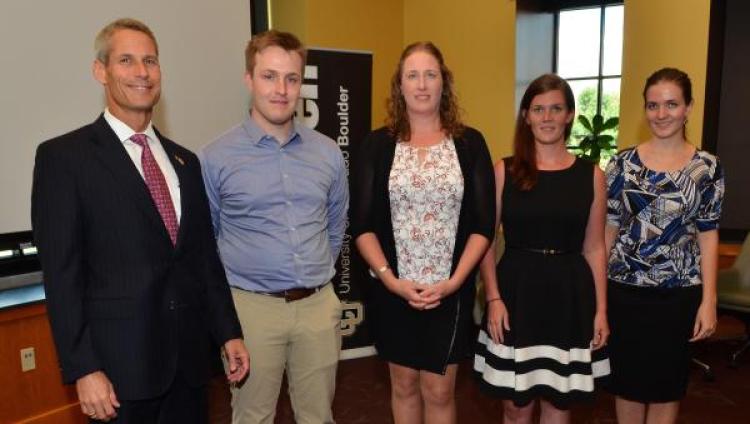
Lockheed Martin Chief Technology Officer Keoki Jackson met with several students working on Lockheed Martin-supported research projects. From left to right: Keoki Jackson, Andrew Wylde, Lt. Col. Diana Loucks, Caitlyn Cooke and Paige Anderson Arthur.
Students and graduates will be able to take advantage of the RF Payload Center of Excellence at Lockheed Martin’s Waterton Canyon site. Six students so far have learned the intricacies of satellite radio development. Among them is Andrew Wylde, a concurrent bachelor’s/master’s student in electrical, computer and energy engineering.
During his internship in the microelectronics assembly area of the RF Payload Center of Excellence, Wylde was able to tune a low-noise amplifier in only six hours. Tuning can take about two days to complete, but as the hybrid assembly process improved, he was able to tune the hybrid in a fraction of that time.
“The RF Payload Center of Excellence on Space Systems’ campus and its manufacturing line is a full-building, cross-team effort, and nothing here can be accomplished without the person next to you,” Wylde said.
Keoki Jackson, Lockheed Martin’s chief technology officer, announced the partnership during a day of meetings, presentations and tours of campus research laboratories.
“Each person depends on RF technology in one way or another, from television and radio, to phone communications, to GPS navigation,” Jackson said. “As the complexity of our satellite systems and national security solutions grows, so does our demand for world-class talent. This partnership ensures that University of Colorado graduates have the skills they need to build the systems of the future while also advancing Lockheed Martin’s ability to develop revolutionary and relevant innovation.”
Cleaning up water in developing countries
 The University of Colorado Boulder has been selected to lead a $15.3 million effort to improve the sustainability of water, sanitation and hygiene (WASH) interventions in the developing world.
The University of Colorado Boulder has been selected to lead a $15.3 million effort to improve the sustainability of water, sanitation and hygiene (WASH) interventions in the developing world.
Karl Linden, Amy Javernick-Will and Rita Klees of the Mortenson Center in Engineering for Developing Communities will coordinate the efforts of seven organizations in sub-Saharan Africa and Southeast Asia.
Globally, more than 2.4 billion people lack access to improved sanitation facilities, and 660 million people are without access to safe drinking water. The Sustainable WASH Systems Initiative aims to develop, test and document high-potential approaches to engaging local water, sanitation and hygiene systems across multiple countries. The goal is to determine which systems can be sustained by local stakeholders beyond the life of the project and inform future development assistance efforts.
The group wants to ensure that water or sanitation services financed by government or donor investments maintain results in the long term. For instance, over the past 20 years, failed hand pumps in Africa represent a total lost investment of between $1.2 billion and $1.5 billion; 30 to 40 percent of rural water systems have failed prematurely; and more than half of all subsidized toilets are unused, misused or abandoned.
CU Boulder will also partner with local universities, providing analysis of the groups’ efforts and publishing their findings.
“The opportunity to work with the partners on this program, in the international spotlight, is tremendous, and we are excited to get our students in the field and put into practice what they’ve studied,” Linden says.
Students find their place with Engineering Plus

 Undergraduate engineering programs are not known for being flexible. Research shows engineering students can devote about 2 percent of their degree credit hours to elective courses, compared with almost a quarter of credit hours for their nonengineering peers.
Undergraduate engineering programs are not known for being flexible. Research shows engineering students can devote about 2 percent of their degree credit hours to elective courses, compared with almost a quarter of credit hours for their nonengineering peers.
The college’s Engineering Plus (e+) degree provides a more flexible path for students with interests outside engineering. Students in the e+ program can devote up to 14 percent of their degree to free electives and up to 37 percent to nontechnical pursuits.
E+ prepares students to excel in engineering without sacrificing their passions, says Marissa Forbes, a college researcher engaged with e+ since the beginning. Forbes and the e+ faculty recently completed a comprehensive analysis of the role of curricular choice in the program, and the resulting paper was selected as a best paper at the American Society for Engineering Education’s national conference last year.
The program is also a destination for students who find themselves stifled by a traditional engineering discipline, Forbes says.
Many students choose Engineering Plus because of the focus on hands-on design, she adds. Unlike traditional programs, which usually include design courses only at the beginning and end of an undergraduate’s experience, design projects are part of the e+ curriculum each year. That hands-on, design focus is especially important for those looking to teach secondary math, science or engineering in K-12.
Forbes stresses that a more flexible curriculum isn’t a one-size-fits-all solution. “It’s important to have both options available,” she says. “If a student wants a discipline-based career, they should probably follow the traditional path and get a (professional engineering license).”
CMU-CU join forces again
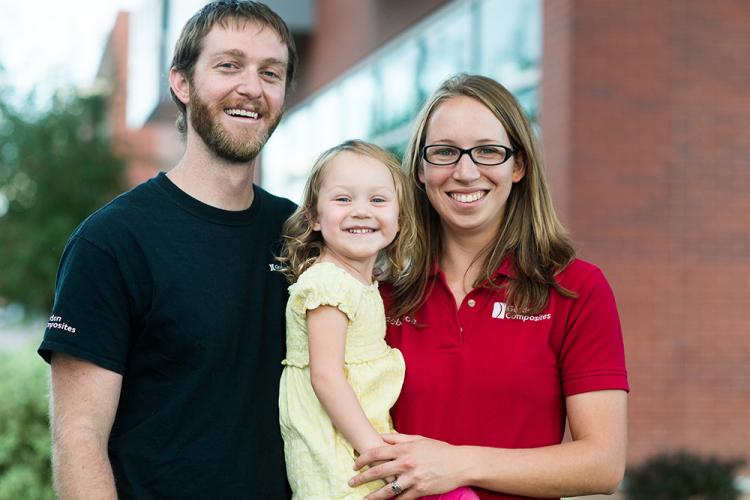
CMU-CU Boulder mechanical engineering program graduates Daniel and Rebecca Gatt with their daughter Emma
Colorado Mesa University and CU expanded their partnership this year to allow students to earn a BS in civil engineering from CU Boulder by taking classes delivered at Colorado Mesa.
Until now, the partnership—which launched in 2008—allowed students to earn a bachelor’s degree in mechanical engineering from CU Boulder by taking classes in Grand Junction.
“The mechanical engineering program offered jointly has been quite successful, and the addition of civil engineering will be a benefit to Western Slope students and to employers trying to meet the regional need for civil engineers,” CMU President Tim Foster says.
Demand for engineers on
the Western Slope
A recent CMU survey of 78 businesses and agencies in western Colorado that hire or work with civil engineers showed that 61.5 percent think there is a moderate to high demand for civil engineers in western Colorado. More than half of them said they are interested in hiring students for full-time summer work, and more than 40 percent said they are interested in hiring civil engineering graduates.
Modeled after the CMU-CU mechanical engineering program, students will receive CMU instruction and classes for the first two years and then primarily CU Boulder coursework for their final two years.
By sharing costs and faculty, and collaborating on laboratory and technology needs for this rigorous program, CMU and CU Boulder are better preparing top-tier engineers.
Smead gift to accelerate CU aerospace program
Antonella Albuja’s doctoral degree in aerospace engineering just became more valuable, as did the educational, research and career prospects of those who follow her in the Smead Program.
A new gift to the College of Engineering and Applied Science from passionate supporters Ann Smead and her husband, Michael Byram, are helping to make this possible and strengthening Colorado’s aerospace economy in the process. With support totaling more than $15 million, the family aims to set CU Boulder apart from its aerospace peers and propel it to the top of national rankings by attracting the best and brightest doctoral students - like Albuja – as well as outstanding young faculty in aerospace engineering.
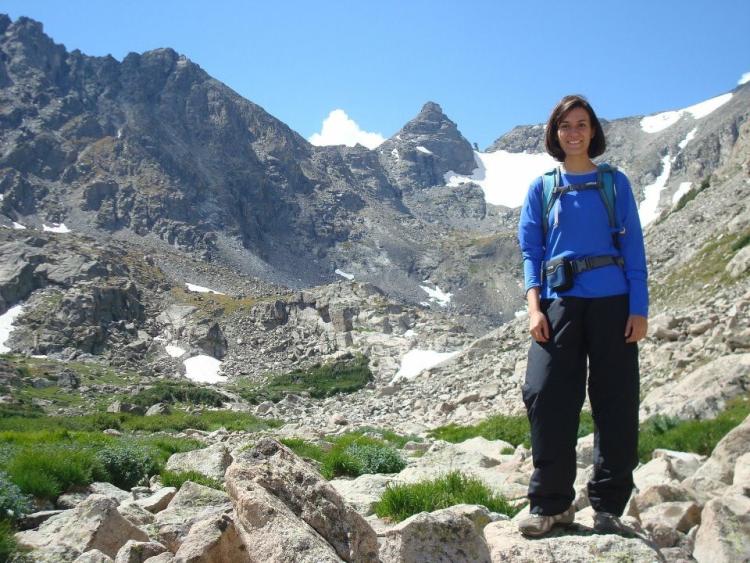
Smead Program alumna Antonella Albuja after a hike on the Lake Isabelle Trail
To celebrate their support, CU Boulder has named the “Ann and H.J. Smead Department of Aerospace Engineering Sciences” in honor of Ann and H.J. “Joe” Smead, an engineering alumnus, industry executive and Ann’s husband prior to his passing in 2003.
Albuja, 27, now working for The Aerospace Corp. in El Segundo, California, said she was “blown away” when she learned of the generous support.
“I am a bit speechless after hearing that number,” said Albuja, whose dedication as a student and willingness to grow as a leader make her a shining example of a Smead Scholar. “This provides CU with a tremendous amount of resources and allows CU to grow and continue to be at the top of the field and to attract the best candidates in the graduate school program - and even undergraduates, as the department’s reputation grows.”
The family created the Smead Fellows Program in 2006 to support the aerospace engineering studies of two new doctoral students annually. The fully endowed program enables students (renamed “Smead Scholars”) the academic freedom to explore their primary research interests while being mentored by world-class faculty and advisors. Smead Scholars also receive professional development training in leadership, project management, grant writing and ethics, and attend prestigious workshops, seminars and lectures around the world through throughout their graduate studies.
Bobby Braun, dean of the College of Engineering and Applied Science, former NASA chief technologist and nationally known aerospace leader, described the gifts as “transformational” for the college, the university and the state.
“Ann and Michael know that building a world-class aerospace program requires dedication, vision
and the passion of a community of innovators,” Braun said.
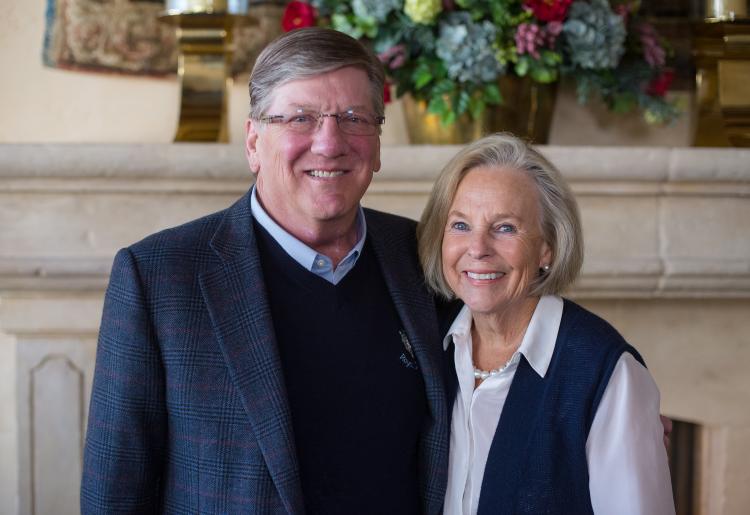
Benefactors Michael Bryan and Ann Smead
A personal touch
The most important aspect of the program to students like Albuja is how much Smead and Byram, leaders in their Vail Valley community, care about students.
“The financial aspect is very helpful, but the best part of being a Smead Scholar is my interactions with Ann and Michael,” she said. “They genuinely care about us. Not just as an investment, but as people.”
Byram and Smead talked to Albuja about how she was handling stress during her studies. They were very excited when she got married to Dan Lubey, another Smead Scholar. When Albuja and Lubey bought a condo, Smead and Byram sent a thoughtful housewarming gift.
Ann Smead said it was a joy to see the transformation of Albuja from a shy graduate student to a confident young professional presenting papers around the world.
“Their involvement leaves you feeling like you’re part of something that’s much greater than you,” Albuja said. “They really want to open up doors for you to be able to build your network and succeed in your career so you can actually make a difference.”
The legacy of Joe Smead
H.J. “Joe” Smead (1925-2003), a native of Spokane, Washington, graduated from the CU Boulder in 1946 with a bachelor’s degree in electrical engineering. Joe was able to attend CU through the U.S. Navy’s WWII V-12 program and upon graduation served as an ensign aboard the USS Columbia. He subsequently earned a master’s degree from the University of Washington and a PhD from Purdue University. From 1954 to 1973, Joe was employed in electronic systems engineering by Litton Industries and Teledyne Corp. He became president and CEO of Kaiser Aerospace and Electronics Corp. in 1974. He continued to lead the company as president, CEO and chairman until 1999.
Joe was a leading member of the CU Boulder Aerospace Engineering Sciences’ volunteer External Advisory Board and played a pivotal role in the establishment of the Seebass Endowed Chair in Aerospace Engineering Sciences. For his many professional accomplishments and volunteer commitment to CU Engineering, he was awarded the Distinguished Engineering Alumnus Award.
Smead had a lifelong passion for learning. He quietly, and typically anonymously, supported scholarships and teaching programs as he recognized his responsibility to give back to that which had helped him achieve and accomplish so much.

From left, Dan Lubey, Ryan Skinner, Conor Benson, Antonella Albuja, Marielle Pellegrino, Michael Byran, JoAnna Fulton, Shaylah Mutschler, Ann Smead, Ann Dietrich, Andrew Harris, Jason Roadman


